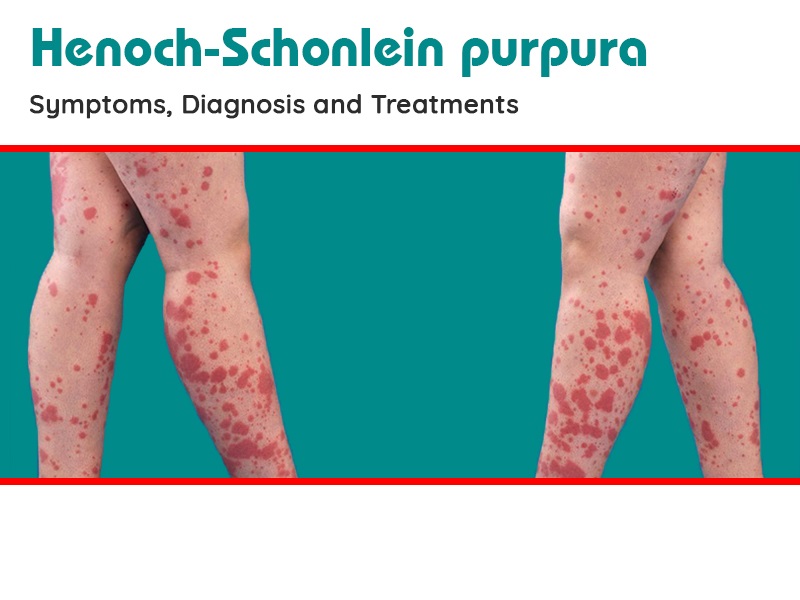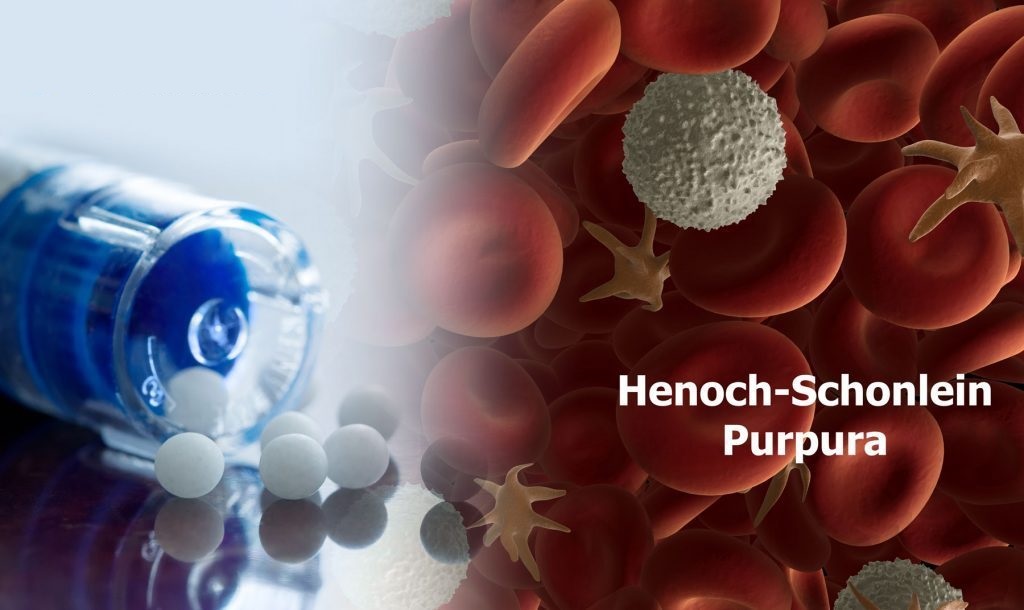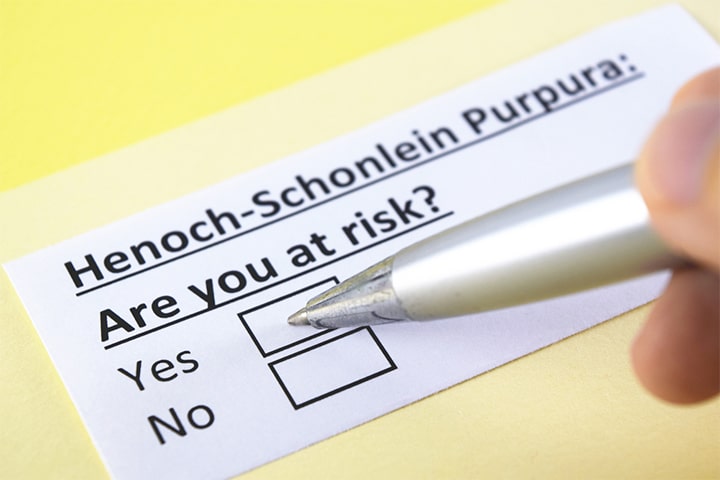WHAT IS HENOCH-SCHONLEIN PURPURA?
Henoch-Schonlein purpura (also called IgA vasculitis) is a disorder that causes the small blood vessels in your skin, joints, intestines, and kidneys to become swollen and bleed.
The most striking feature of this type of vasculitis is a purplish rash, generally on the lower legs and buttocks. Henoch-Schonlein purpura could also cause abdominal pain and aching joints. Rarely, severe kidney damage could happen.
Henoch-Schonlein purpura could affect anyone, but it is most common in children between the ages of two and six. The condition generally improves on its own. Medical care is generally required if the disorder affects the kidneys.

HENOCH-SCHONLEIN PURPURA SYMPTOMS
The four primary characteristics of Henoch-Schonlein purpura include:
- Rash (purpura) – Reddish-purple spots that look similar to bruises develop on the buttocks, legs, and feet. The rash could also appear on the arms, face, and trunk and might be worse in areas of pressure, like the sock line and waistline.
- Inflamed, sore joints (arthritis) – People with Henoch-Schonlein purpura usually have pain and inflammation around the joints primarily in the knees and ankles. Joint pain sometimes precedes the classical rash by 1 or 2 weeks. These symptoms diminish when the disease clears and leave no lasting damage.
- Digestive tract symptoms – Many children with Henoch-Schonlein purpura develop stomach pain, nausea, vomiting, and bloody stools. These symptoms sometimes happen before the rash appears.
- Kidney involvement – Henoch-Schonlein purpura could also affect the kidneys. In most cases, this shows up as protein or blood in the urine, which you might not even know is there unless you have a urine test done. Generally, this goes away once the disease passes, but some people develop continuous kidney disease.
WHEN SHOULD YOU SEE A DOCTOR?
See your doctor or primary care physician if you have Henoch-Schonlein purpura and it is causing severe problems with your digestive tract.
If your child develops a rash related to this condition, see your doctor or primary care physician as soon as possible.
HENOCH-SCHONLEIN PURPURA CAUSES
In Henoch-Schonlein purpura, some of the body’s small blood vessels become swollen, which could cause bleeding in the skin, abdomen, and kidneys. It is not clear why this initial swelling develops. It might be the result of the immune system responding inappropriately to specific triggers.
Nearly half the people who have Henoch-Schonlein purpura developed it after an upper respiratory infection, like a cold. Other triggers include chickenpox, strep throat, measles, hepatitis, specific medications, food, insect bites, and exposure to cold weather.

HENOCH-SCHONLEIN PURPURA RISK FACTORS
Factors that raise the risk of developing Henoch-Schonlein purpura include:
Age – The disease affects mainly children and young adults, with the majority of cases happening in children between the ages of two and six.
Sex – Henoch-Schonlein purpura is slightly more frequent in males than in females.
Race – White and Asian children are more likely to develop Henoch-Schonlein purpura as compared to black children.
HENOCH-SCHONLEIN PURPURA COMPLICATIONS
For most people, symptoms improve within a month, leaving no lasting issues. But recurrences happen quite frequently.
Complications related to Henoch-Schonlein purpura include:
Kidney damage – The most severe complication of Henoch-Schonlein purpura is kidney damage. This risk is higher in adults than in children. Occasionally the damage is serious enough that dialysis or a kidney transplant is required.
Bowel obstruction – In rare cases, Henoch-Schonlein purpura could cause intussusception a condition in which a part of the bowel folds into itself like a telescope, which prevents matter from moving through the bowel.

HENOCH-SCHONLEIN PURPURA DIAGNOSIS
Your doctor or primary care physician will be able to diagnose the condition as Henoch-Schonlein purpura if the classic rash, joint pain, and digestive tract symptoms are present. If one of these signs and symptoms is missing, your doctor or primary care physician might recommend one or more of the following tests.
Lab tests
No single laboratory test could confirm Henoch-Schonlein purpura, but specific tests could help rule out other diseases and make a diagnosis of Henoch-Schonlein seem likely. They might include:
Blood tests – Your blood might be tested if your diagnosis is not clear based on your signs and symptoms.
Urine tests – Your urine might be tested for evidence of blood, protein, or other abnormalities to decide if your kidneys are still working properly.
Biopsies
People who have Henoch-Schonlein purpura usually have deposits of a specific protein, IgA (immunoglobulin A), on the affected organ. Your doctor or primary care physician might take a small sample of skin so that it could be tested in a laboratory. In cases of serious kidney involvement, your doctor or primary care physician might recommend a kidney biopsy to help guide treatment decisions.
Imaging tests
Your doctor or primary care physician might suggest an ultrasound to rule out other causes of abdominal pain and to check for possible complications, like a bowel obstruction.
HENOCH-SCHONLEIN PURPURA TREATMENT
Henoch-Schonlein purpura generally goes away on its own within a month with no lasting ill effects. Rest, plenty of fluids and over-the-counter pain relievers might help with symptoms.
Medications
Corticosteroids, like prednisone, might help shorten the time and intensity of joint and abdominal pain. Because these drugs could have severe side effects, discuss the risks and benefits of using them with your doctor or primary care physician.
Surgery
If a part of the bowel has folded in on itself or ruptured, surgery might be required.
If you or anyone you know is suffering from Henoch-Schonlein purpura, our expert providers at Specialty Care Clinics will take care of your health and help you recover.
Call 469-545-9983 to book a telehealth appointment for an at-home check-up.
